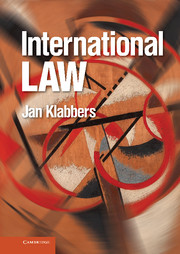Book contents
- Frontmatter
- Contents
- Detailed table of contents
- Table of cases
- Preface
- List of abbreviations
- Part I The structure of international law
- 1 The setting of international law
- 2 The making of international law
- 3 The law of treaties
- 4 The subjects of international law
- 5 Jurisdiction, powers and immunities
- 6 The individual in international law
- 7 The law of responsibility
- 8 International courts and tribunals
- 9 Sanctions, countermeasures and collective security
- Part II The substance of international law
- Part III The surroundings of international law
- Bibliography
- Index
- References
9 - Sanctions, countermeasures and collective security
from Part I - The structure of international law
- Frontmatter
- Contents
- Detailed table of contents
- Table of cases
- Preface
- List of abbreviations
- Part I The structure of international law
- 1 The setting of international law
- 2 The making of international law
- 3 The law of treaties
- 4 The subjects of international law
- 5 Jurisdiction, powers and immunities
- 6 The individual in international law
- 7 The law of responsibility
- 8 International courts and tribunals
- 9 Sanctions, countermeasures and collective security
- Part II The substance of international law
- Part III The surroundings of international law
- Bibliography
- Index
- References
Summary
INTRODUCTION
Popular wisdom has it that international law is a system without sanctions. This nugget of wisdom was popularized by the legal theorist John Austin, writing in the early nineteenth century that international law was little else but ‘positive morality’; there were rules applicable in the relations between states, but these hardly added up to something that could meaningfully be considered ‘law’, for true law, so Austin suggested, consists of emanations from a sovereign backed up by force. International law, not having a sovereign and not accepting the centralized use of force, therefore could not be considered as law. At best, international rules could be morality, and since they were sometimes written down they could qualify as ‘positive’, but that was as far as Austin was willing to go.
While highly critical of Austin, the legal philosopher H. L. A. Hart, in his classic The Concept of Law written in the latter half of the twentieth century, none the less reached a fairly similar conclusion; to his mind, international law was, in a way, law, but did not add up to a legal system properly speaking, largely because rules relating to how international law was made and enforced seemed to be lacking. Again then, the relative dearth of sanctions seemed to suggest that international law was not really law, and even to this day the legal nature of international law is sometimes questioned. To those who equate law with punishment, international law must seem problematic indeed.
- Type
- Chapter
- Information
- International Law , pp. 165 - 184Publisher: Cambridge University PressPrint publication year: 2013



